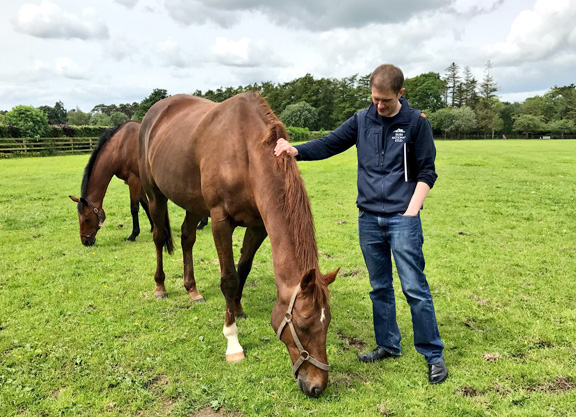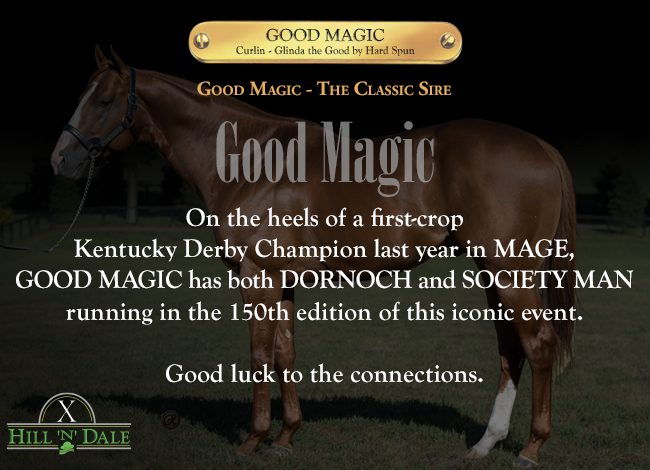By Emma Berry
The coming weeks will see a significant changing of the guard at the Irish National Stud when John Osborne hands over his title of chief executive to Cathal Beale, who has been the farm's bloodstock manager since January.
In many ways, Beale's tenure represents the ultimate goal of the courses operated by the Irish National Stud and Godolphin Flying Start–both of which he has completed–in giving a golden opportunity to a bright young thing originally from a non-racing background. While Osborne hails from one of the most respected families in the bloodstock industry and, on taking up his role back in 2010 was following in the footsteps of his father Michael, who held the same position between 1970 and 1982, Beale readily admits that he is a relative newcomer to the industry.
“I didn't grow up in racing but my father was a big racing fan and I went to college with a view to becoming a racing or sports journalist,” he says brightly from the boardroom of the operation which is both commercial stud farm and tourist destination.
Having sensibly cast aside thoughts of such a reckless career path, Beale augmented shifts as an in-house broadcaster for Paddy Power betting shops by spending his days off accruing some hands-on experience with Ken Bolger at Redmondstown Stud.
“I found I was enjoying the stud work more and more and I learned an awful lot from Ken,” he recalls. “Eventually I took a leap of faith and applied for the Irish National Stud course in 2007.”
It's an even bigger leap from being a student at the stud to being appointed to run it just a decade later but the 34-year-old has packed the ten years in between with some vital experience, not least spending time on the Flying Start course which in its 12-year existence has been the launchpad for so many up-and-coming names of the bloodstock industry worldwide.
He says, “I'd heard of the Darley Flying Start–as it was then–and luckily I was accepted along with the likes of James McHale, Andy Williams and Mick Flanagan. It's a fabulous course and still is. It was a huge help to me having come from outside the circle.”
Placements at leading stud farms in Kentucky and New Zealand as well as Sheikh Hamdan's breaking and pre-training facility in Dubai reinforced Beale's desire to focus on the breeding side and he joined the Smurfit family's Forenaghts Stud, run by Osborne's brother-in-law Dermot Cantillon, on completion of the Godolphin scheme.
“I was at Forenaghts for seven years and was involved on the sales side under the Tinnakill banner which grew an awful lot during in those years. Casamento and Sir Prancealot were both bred there during that time–we had some great success,” he recalls.
“Returning here in January when I became bloodstock manager was a sort of homecoming. I've seen this farm as a student, as a client through Forenaghts and, as of July 1, as the CEO, so I've had a good perspective from all angles. It's very exciting and I'm looking forward to it. It's hard to believe in a way that ten years after doing the course here I'm now in such a senior position.”
It is hard not to be swayed by Beale's almost contagious enthusiasm for a role in life he clearly views as a pleasure rather than a chore. It is not mere naivety, however, more a desire to employ his quietly spoken intellect to best effect in making the most of the opportunities that have come his way. A former chairman of the YITBA (now known as the Next Generation Committee), he is passionate in his drive to ensure other young people with a similar leaning can benefit from training courses akin to those that have shaped his career.
He says, “My being where I am is a testament to the education system that's out there, the fact that there's a pathway and that so many people in the industry are willing to help along the way. There are more and more of these courses available–the HRI internship here in Ireland now and of the course the English National Stud course is going from strength to strength. The ITBA Next Generation Committee also has an apprentice scheme, so there are a lot of avenues for people to work their way through the industry that weren't there 15 or 20 years ago.”
Training of course ranks highly at the Irish National Stud, which is famed for its diploma course, but it is just one element of a completely unique stud business. Running a stallion operation in what is an increasingly competitive field would be taxing enough for some, but Beale will also be called upon not only to maintain the stud's recent good sales record, which has seen it finish in the top ten consignors' table at the Orby Sale for the last five years, but also to oversee the tourism side of the popular visitor venue. On top of his bloodstock qualifications, he has recently graduated with an MSc in management.
“The course incorporated finance, accounting, marketing, human resources, business information systems, all the sort of things that will now become useful in terms of managing the various aspects of the stud,” he says. “We have two main streams that we are involved with–the stud farm and the public utility involving tourism and education. It's that duality that makes us different to other stud farms around, though we have the same commercial realities that every other stud farm has. Ensuring as much synergy between the two is the important thing. It's a huge challenge but an exciting one.”
The most obviously commercial aspect of the stud is its stallion roster, headed by the 20-year-old Invincible Spirit (Ire), with Free Eagle (Ire) the most recent recruit to the eight-strong team. Continually enhancing that line-up, particularly as Invincible Spirit heads into his twilight years, is a challenge the Irish National Stud shares with the majority of its rivals.
Beale says, “Fortunately, we have a history of producing stallions. Indian Ridge and Invincible Spirit came from relatively lowly bases to become very influential stallions. You can't do that on your own and historically we've had a really strong team of syndicate members who have come in. Because of the goodwill people generally have towards this place, they have been very supportive.”
He continues, “Obviously it's very competitive to acquire stallions. To get the next Invincible Spirit isn't really the goal. The goal is to try to attract stallions that people want to breed to and that will then become viable. We all know that it gets difficult with the majority of stallions to retain their commercial appeal in years three and four so success is probably measured if you can get past years four or five and still have a good chance of getting a return on your investment. We continue to work hard to source stallions in whatever way we can but it's getting harder–most of the good colts have been acquired before they even run in a Classic.”
In continuing this quest, along with myriad other challenges which will doubtless come his way during a seven-year term of office that commences on July 1, Beale is blessed by having been able to spend six months working with his predecessor, whom he acknowledges is a tough act to follow.
“John has done a phenomenal job. He's brought the place through from the days when it was struggling to a position of real strength. There are options for the person coming in now thanks to him. We're on a much more stable foothold and in a position to move forward positively, and that was no small feat,” he says.
“There's continuity–I understand what John was trying to achieve and we have the same board members. I've already been working here for several months so there's been a transitional phase already and we won't lose any time. Hopefully we can just move on fairly seamlessly when the handover happens.”
Osborne himself points to the fact that his revered father was only two years older than Beale when he took on stewardship of the stud, while he was the “old man” when starting his term seven years ago at the age of 45.
In 2015, the Irish National Stud reached the milestone of 100 years since its former owner Colonel William Hall Walker sold his private farm in Kildare to the British government. Since 1945, when the land was acquired by the Irish government and an act of parliament was passed to ensure its future, the business has operated under the banner of the Irish National Stud Company. As it heads forth into its next century, the continuing health of a state-owned farm in a nation which takes immense pride in its thoroughbred heritage will doubtless be the driving force throughout Beale's tenure.
Not a subscriber? Click here to sign up for the daily PDF or alerts.






